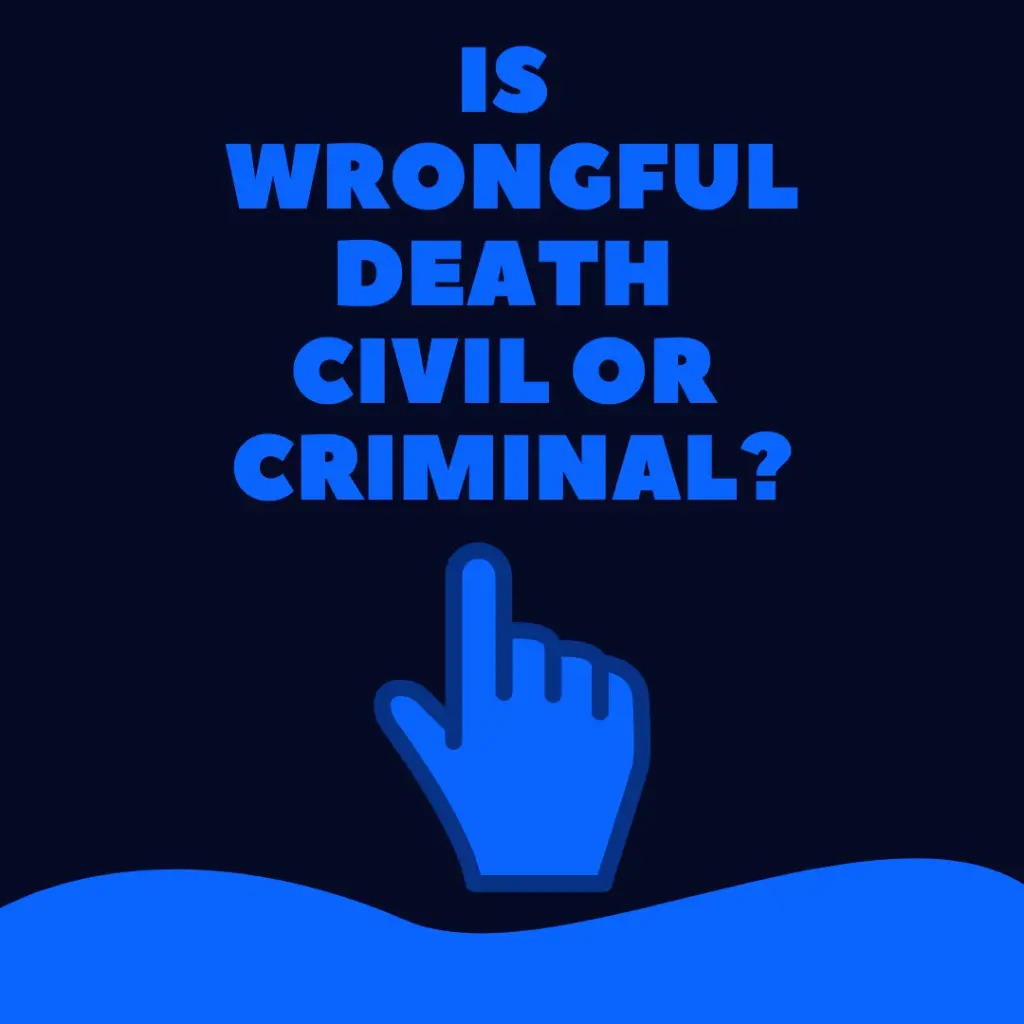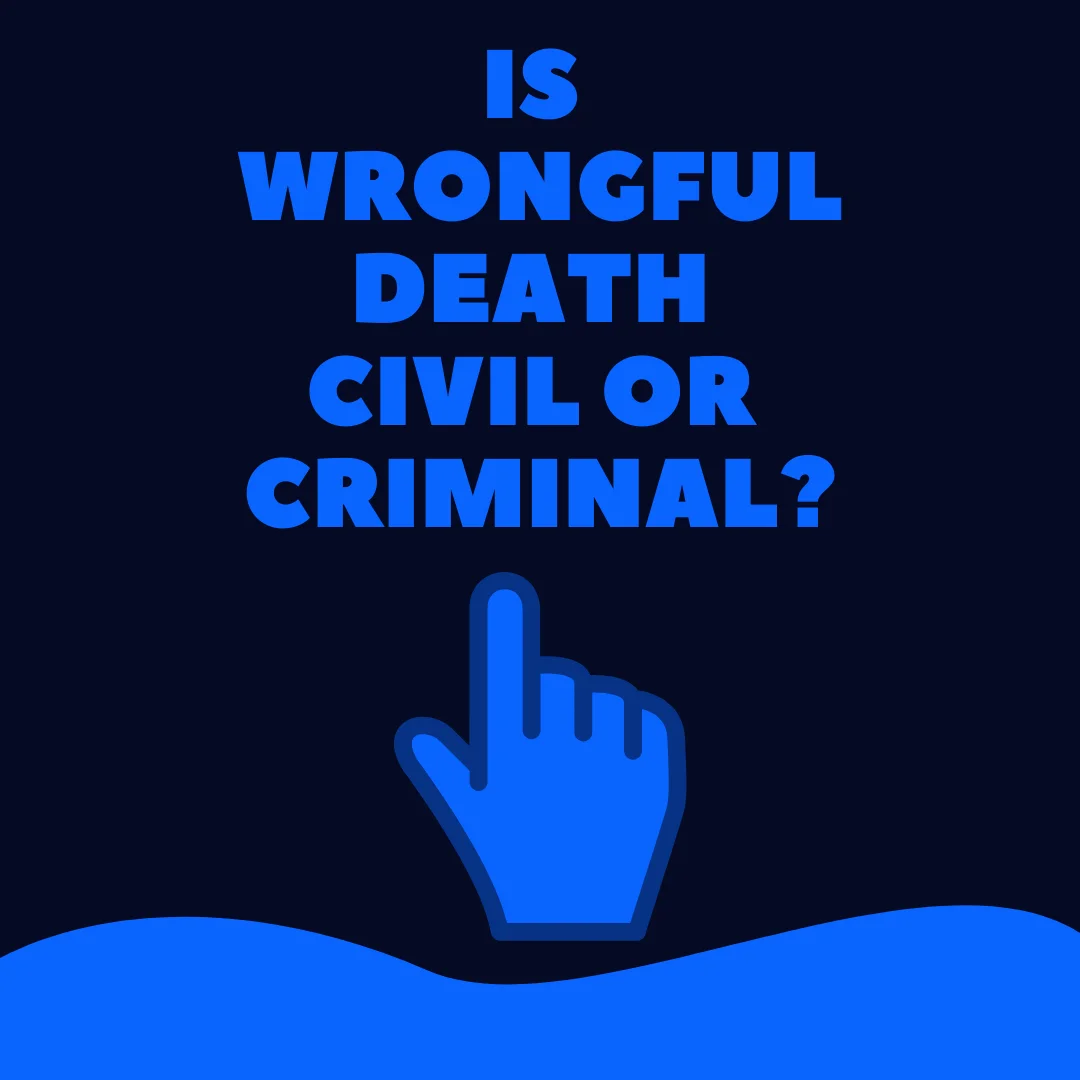Wrongful Death is the name given a civil case involving the death of someone who should not have otherwise died.
It is not a criminal case.
Is Wrongful Death Civil Or Criminal? (EXPLAINED)
Disclaimer
The contents of this web page are for informational purposes only, and nothing you read is intended to be legal advice. Please review our disclaimer about law/legal-related information on this website before taking action based upon anything you read or see.
What Is A Civil Case vs A Criminal Case?
The distinguishing factors between a civil case and criminal case are who the participants are, the outcome sought, and the burden of proof.
In a civil case, the participants (plaintiff/petitioner and defendant/respondent) are citizens, businesses, and organizations.
Sometimes, the parties are even government entities (like the Department of Agriculture).
In a criminal case, the plaintiff (meaning the party filing the claim) is the government.
It could be the city, the county, the state, or even the federal government.
A regular person (like the person reading this article or the one who wrote it) could not file a criminal case against another person.
Usually, the case will be led by a prosecutor of many levels (city, state, federal), or a district attorney.
Next, in a civil case, the outcome sought varies.
Sometimes the parties want money.
Sometimes one party wants the other party to do something.
Sometimes one party wants the other party to stop doing something.
But in a civil case, the outcome is never jail.
In a criminal case, the outcome sought by the plaintiff can be a monetary fine, jail, and restitution for the losses of the victim(s), depending on the seriousness of the case.
But jail is a pretty key differentiator.
In a civil case, the burden of proof is much lower than what you will see in a criminal case.
The “burden of proof” in simple terms means how much evidence is needed to prove the case.
In the United State of America, we take the freedom and liberty of the citizens of this country pretty seriously.
As a result, the burden of proof in a criminal case needed to put someone in jail (take away his liberty and freedom to move around), is far greater than the burden of proof needed to assess a monetary judgment against something.
In fact, in most cases, the burden of proof in a criminal case involving jail or other restrictions of freedom is the legal highest burden of proof in a particular jurisdiction.
In the criminal side of things, the burden of proof is said to be “beyond a reasonable doubt.”
This is not “beyond a shadow of a doubt.”
This is just beyond a reasonable doubt.
Certainly lawyers will argue in the case about whether the evidence in the case meets the burden of proof.
In the civil side of things, depending on where you are located, the burden of proof might be said to be “a preponderance of the evidence.”
A preponderance of the evidence is a lower burden of proof that beyond a reasonable doubt.
In fact, it is often the lowest burden of proof, which means that theoretically, it is easier to prove a case in civil court.
This also means that the same evidence that failed to produce a criminal conviction could still result in a desirable jury verdict in a civil case.
Guilt As The Goal
In a criminal case, the jury or judge hearing the evidence and making the decision about the outcome will be addressing the “guilt” of the defendant.
In the United States, outcome will be “guilty” or “not guilty.”
In other jurisdictions around the world, there might be an outcome that is “innocent” in addition to “guilty” and “not-guilty.”
But not in the United States.
In a civil case, the outcome or verdict delivered by a judge or jury is never guilty or not guilty.
Instead, it might be “liable” or “not liable.”
Or, depending on the case, there might be a percentage of fault assigned to the defendant, such as only 25% for the damages proven by the plaintiff.
In the criminal case, the verdict form is less complicated, as the outcome is generally focused on guilt vs not-guilt.
In the civil case, the verdict form could be quite complicated, as it comes down to what it is that the plaintiff is alleging against the defendant.
Why Is Wrongful Death A Civil Case?
There are multiple reasons that wrongful death cases are civil and not criminal.
First and foremost, wrongful death cases are creatures of statute.
Statutes meaning the written and published laws of a particular place (state, country, etc).
In most cases, wrongful death law is written into the civil codes of jurisdictions, not the criminal code.
Because wrongful death laws are in the civil code, the statutes and rules that govern wrongful death cases are not applicable to criminal actions and cannot be used in criminal cases (unless a criminal statute so states).
Second, each jurisdiction has its own criminal cause of action to be applied if someone is wrongfully killed by someone else.
The terms vary depending on where the death occurs, but they might be called: murder, manslaughter, homicide, negligent homicide, and felony murder, among other names.
These terms may come with varying degrees (in the first degree, second degree, third degree, and so on).
Each type of criminal death type case has a statute that guides the parties and the court as to what must be proven, and what the potential penalty can be assigned at the conclusion of the case.
Wrongful death is a civil case because the applicable government agency will be pursuing the charges that the criminal code allows based upon the evidence in the case.
Can A Wrongful Death Result In Both A Civil And Criminal Case?
Absolutely, 100%.
The civil and criminal statutes generally do not overlap.
As noted above, the parties are different, the statutes are different, and the burdens of proof are different.
A civil claim for wrongful death can be filed even if a criminal death case is not filed.
If a criminal death case (like murder or manslaughter is filed), there is nothing requiring anyone to file anything on the civil side.
These cases can be filed at the same time, though there tend to be tactical reasons for parties to wait to file a civil case until the criminal case is complete.
Can You Sue Someone For Wrongful Death If They Have Already Been Convicted In Criminal Court?
Yes, you can.
Sometimes, lawyers in the civil case will wait until the conclusion of the criminal case, as the conviction can actually assist in either settling the wrongful death claim without having to file a civil lawsuit, or it can help the plaintiff prove the allegations against the defendant.
Sometimes parties will choose not to file a wrongful death case against someone who has been convicted in a criminal death case.
Circumstances vary, but sometimes people pass on the civil death claims because:
Defendant Is In Jail. If the party who did the wrong is already convicted and sent to jail, the family may fee like justice has been sufficiently, done.
Defendant Has No Money. In a civil wrongful death case, the plaintiff(s) is usually seeking payment of money.
If the defendant has no money, no assets, no chance of ever acquiring any assets, or will also be in jail for the rest of their life, there may be little to be gained from filing an action against them.
Insurance Pays Up. If the party who did the wrong had insurance that covered those actions, then often a condition of accepting insurance money is the agreement to not pursue any additional claims or lawsuit against the person who was insured.
Emotional/Financial Toll. Death cases involving wrongful or criminal acts can be tortuous for the loved ones of the person who died.
In either civil or criminal cases, the family and friends help assemble relevant evidence, provide background information, and even have to testify.
In a high profile case, this can result in loss of privacy, bullying online or in person, and even loss of income/employment.
For some people, seeing the wrong-doer punished for the crimes is enough.
Then they are ready to move on.
Is There Such Thing As A Wrongful Death Crime?
Generally, there are crimes associated with deaths that are or were wrongful.
But “wrongful death” is a term of art used in the legal world to refer to the civil side of claims involving someone’s death.
The criminal side has it’s own terms of art (such as murder, homicide, etc).
You won’t see anyone charging a defendant with the “crime of wrongful death.”
Looking For More Information About Wrongful Death Cases?
We are building up a library of articles intended to assist people facing a wrongful death lawsuit from any angle.
The Wrongful Death Article Library is intended to help make your first conversation with a lawyer, prosecutor, defense attorney, insurance adjuster, or other involved party easier.
You can find the growing Wrongful Death Article Library here.
You might also like:
- How Long Does It Take To Settle Wrongful Death Claims?
- Is There a Time Limit On Wrongful Death Cases?
- How Do Wrongful Death Lawyers Get Paid?
- Tips For Filing a Wrongful Death Case
- What You Need To Know About Wrongful Death Punitives
- What is a Deposition in a Wrongful Death Lawsuit?
- Who Pays For Witnesses in a Wrongful Death Lawsuit?
- Are Wrongful Death Settlements Public?
- Is Wrongful Death Civil or Criminal?


